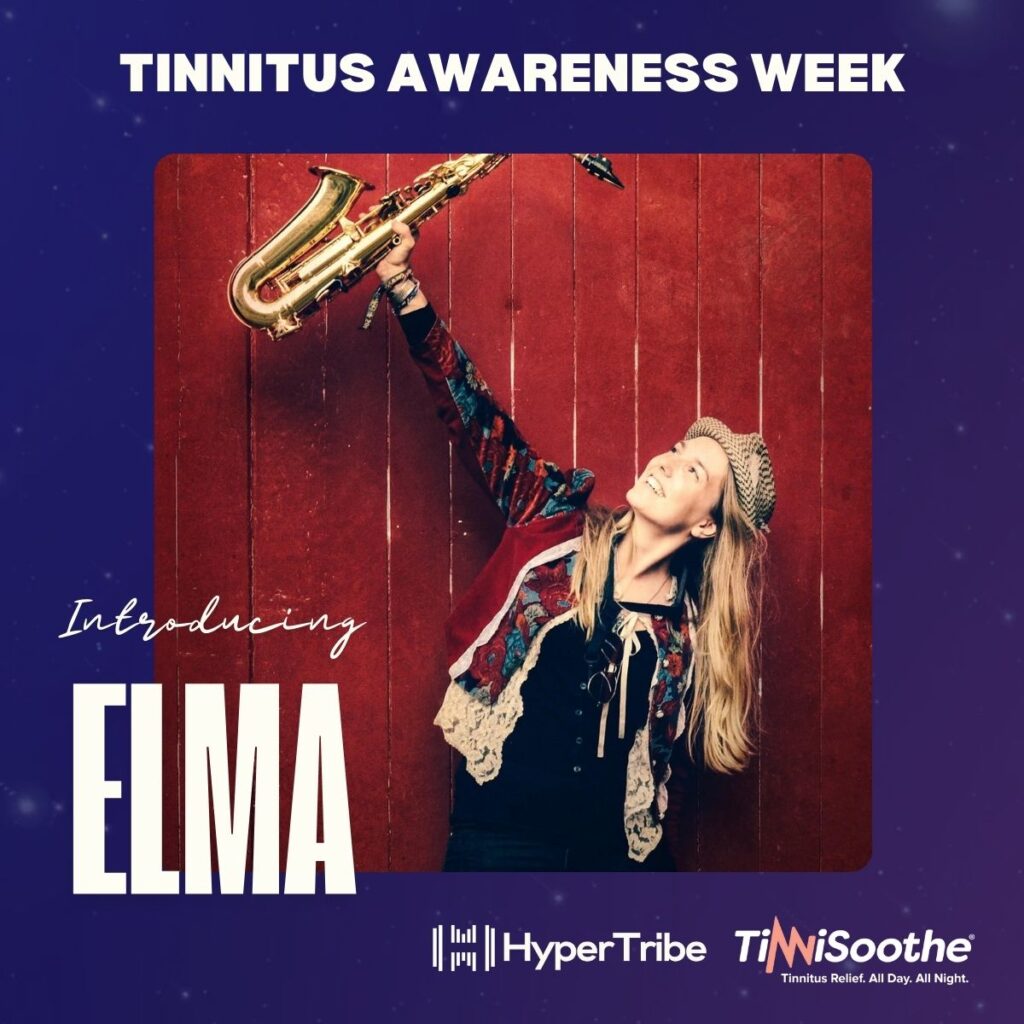At HyperTribe, we are amplifying the voices of musicians who face unique challenges in their careers. As part of our collaboration with TinniSoothe, we are sharing the stories of five artists living with tinnitus. Today, we spotlight Elma Sax, a saxophonist, multi-instrumentalist, and performer whose journey through music and hearing loss is one of resilience and reinvention.


A Journey Through Sound
Elma’s musical journey has been international, spanning multiple bands, collaborations, and solo performances across the world. “Music was always an escape for me,” she shares. “It was a way to connect with people, a way to express myself when words weren’t enough.”
From early school competitions to a successful self-employed career in music, Elma built a full-time income from performing. “I was doing really well, fully supporting myself through music,” she recalls. But as her career grew, so did the impact of tinnitus, reshaping her relationship with sound.
Make sure to give Elma a follow to keep up with her story here.
Living with Tinnitus: A Constant Battle
Elma first noticed tinnitus when she was 15, after moving to a quiet rural area. “At night, I started hearing this high-pitched ringing, mainly in my right ear,” she says. Over time, the condition worsened, peaking after years of performing in loud environments. Then came a new challenge—low-frequency tinnitus in her left ear, a constant deep hum that felt like “a rave happening inside my head.”
“The worst part was that it was 24/7 for five months straight,” she says. “It completely changed my life. I struggled to sleep, to function, to engage with people. The impact on my mental health was huge.”
The Daily Impact of Tinnitus
Elma describes how tinnitus shapes her day-to-day life. “I struggle to sleep, and I avoid noise that feels triggering. Sudden high-pitched sounds or people shouting too close to my ear can cause my body to shut down,” she explains. She also experiences unexpected “explosions” in her ears—sudden pops and hissing that cut her off from conversations, making social interactions difficult.
“It’s exhausting,” she admits. “Not just from lack of sleep but from the constant battle with noise, from trying to filter out the sounds I don’t want to hear while managing the ones that won’t go away.”
A New Relationship with Music
Despite these challenges, Elma has found ways to adapt. “Tinnitus has pushed me to seek out more soothing sounds,” she says. “If my tinnitus is bad, I’ll play guitar instead of saxophone. I do more singing. I’ve incorporated wind chimes into my music—they help calm me.”
“I have made big adaptations to how often and where I work, but I’m keen not to lose opportunities for work due to tinnitus,” she continues. “I think it is possible to continue working as a musician with the right measures and support in place.” While her performances have become shorter, she still works regularly at weddings, private parties, and DJ gigs. “I choose more daytime events and garden parties, but I still love taking on club and bigger gig opportunities,” she explains.
Elma has also recently invested in in-ear monitors to help manage performing in clubs and venues. “The more professional the club, sound, and equipment, the better,” she adds. “It’s just easier doing one-off events than many regular club shows. The key is managing my environment and how I perform.”
Breaking the Silence on Tinnitus
Elma believes that musicians need better awareness and support when it comes to hearing health. “There’s a huge lack of understanding about tinnitus in the industry,” she says. “People don’t realize how serious it is until they experience it.”
She suggests that sound engineers and venues take more responsibility for preventing hearing damage. “We need better-trained sound techs. I’ve had gigs where extreme feedback left me rattled for days. It’s not just an inconvenience—it’s traumatic.”
Elma also advocates for quiet spaces in venues where musicians can rest their ears between sets. “After an hour of exposure to loud music, your ears need a break. More venues should offer that, especially for low-income artists who can’t afford high-end hearing protection.”
A Message to Musicians with Tinnitus
Elma is passionate about helping other musicians see that tinnitus isn’t the end of their career. “Tinnitus isn’t necessarily permanent—it can get better,” she says. “You have to reframe your relationship with it. The more you fear it, the worse it gets. You have to embrace it, not let it control you.”
Her advice? “Take care of your hearing. If you notice symptoms, act fast—get earplugs, take breaks, and seek help. And don’t isolate yourself. Talk to other musicians who understand.”
Being Part of the Campaign
For Elma, joining this campaign is a way of both sharing her story and finding strength in community. “I’ve suffered so much from tinnitus, but I know I’m not alone,” she says. “I want this campaign to empower other musicians to take control of their hearing health.”
She’s also eager to try TinniSoothe, intrigued by the possibility of relief. “I’ve heard great things about it, and I’m hopeful it could help manage my spikes. Even if it helps just one person, it’s worth it.”
Looking Forward
Despite her struggles, Elma remains dedicated to her music. She dreams of collaborating with saxophonist Candy Dulfer, one of her lifelong inspirations. “She’s been my idol since I was young. It would be amazing to stand back-to-back and play like she did with Prince,” she says with a smile. “I’d love to prove that, despite everything, I can still hold my own.”
Through this campaign, HyperTribe and TinniSoothe are proud to stand with Elma and all musicians navigating tinnitus. Stay tuned for more stories, and join us in raising awareness for hearing health in the music industry.



